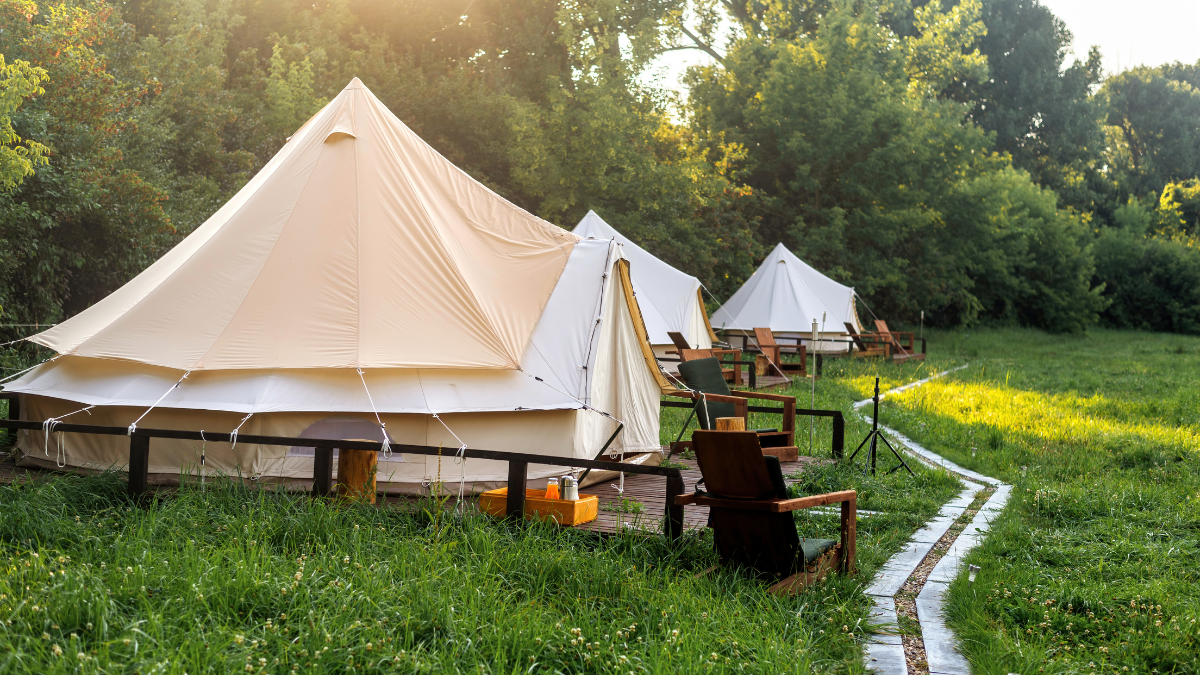Over the past three years, people have been taking to the great outdoors to reconnect with family and friends, test out pandemic-friendly outdoor activities, and disconnect from all the technology that demands our daily attention. For many people, this looked like traditional camping. For others, escaping to the outdoors looked a bit more luxurious in the form of glamping.
Alongside this rise in glamping (expected to be a $7.11B industry by 2031), glampers have demonstrated a heightened awareness of sustainable practices. A recent global survey by Accenture said that consumers have dramatically evolved and that 60% reported making more environmentally friendly, sustainable or ethical purchases – including vacation and leisure. Nine out of 10 surveyed also intend to continue doing so.
Today, this means glampground owners and operators are tasked with balancing greater glamping demand while simultaneously catering to heightened sustainability expectations. Technology – and more specifically, a reservation management system – can be a huge asset in these efforts. As the central hub for your operations, these versatile, cloud-based platforms are well-positioned to enact lasting and impactful environmental changes to your business. Here are a few ways your tech system can help you get greener.
1. Go Paperless & Reduce Waste
Everything is digital these days, so there isn’t a need to print things like receipts, guest forms or confirmations if they can be sent digitally via email or text. As the connecting point for operations, your reservation management system can integrate all your operations under one platform and eliminate the need for printing. From a staff and employee perspective, your reservation management system can also take the place of printed schedules, paper maps and manual budgeting and accounting.
2. Make It Mobile
The pandemic showed us that travelers were ready to embrace mobile and self-service operations, and doing so can also be good for the planet. Many reservation management platforms support mobile guest operations like keyless entry, digital payment and self-check-in/out. Other mobile features to look for include digital maps, parking permits and guest communications.
Your guests aren’t the only ones who can leverage mobile options - so can your staff. A cloud-based system allows staff to access business operations from anywhere with an internet connection. This gives them greater freedom to move about the grounds and tend to guests. Need to make a change to a reservation? No need to haul guests back to the main building; you can make the change right there. Groundskeepers and maintenance staff can log shifts and make reports while on-site with facilities in clear view.
3. Reduce Technology Waste with Cloud-Computing
Using cloud-based solutions also helps reduce technology waste. Rather than building and maintaining their own servers and data centers, cloud-based systems share server space with other services and applications. Combining server space reduces overhead maintenance costs, like heating and cooling, and reduces the emissions produced from construction, which are a high contributor to greenhouse gases. Cloud servers are also designed to be more efficient because they need to support multiple services at once. Rather than contributing an equal portion of computing capacity to all services at once, the server can allocate resources dynamically, using only what is needed when it’s needed.
4. Improve Operational Efficiency with Business Intelligence
Improving efficiency can significantly impact your property’s carbon footprint and bottom line. Use a reservation management system that incorporates business intelligence to gather and analyze data across all operations and find ways to cut back on unnecessary costs. For example, BI can help predict peak and low reservation periods so you can schedule staff accordingly. BI can also be applied to operations like inventory management and help you optimize deliveries or even cut out items you aren’t using enough.
5. Create Sustainable Partnerships
Most reservation management systems have a network of integration partnerships to provide glampground owners and operators with flexible, customizable environments that best fit their business. When looking for integration partners, see if your software vendor has partnerships with any green vendors that you can work with. A good example of a green vendor is an energy management system. These companies monitor the use of different utilities to calculate how much your facility uses and present an overhead view of energy use. We often don’t realize how much of something we are using until we start to measure it. Gaining insight into use is the first step towards reducing it with other measures like automatic lights, smart thermostats and installing energy-efficient appliances.
A More Sustainable Future
Many glampgrounds actively rely on reservation management systems for daily operations like guest reservations, check-in/out, and revenue management. In 2023, glampground owners and operators should look beyond these standard use cases for their technology platforms and explore ways to support their eco-friendly goals. On the flip side – for properties that haven’t adopted a reservation management system but are looking for ways to increase efficiency, revenue, and business oversight, it’s time to seriously consider finding a tech partner to help.
Ultimately, long-term, sustainable change comes in small steps. No one expects a complete overhaul in a year. But every step your property takes can make a difference to the environment, your overhead and in showing your environmentally conscious guests that your property supports a better world.




